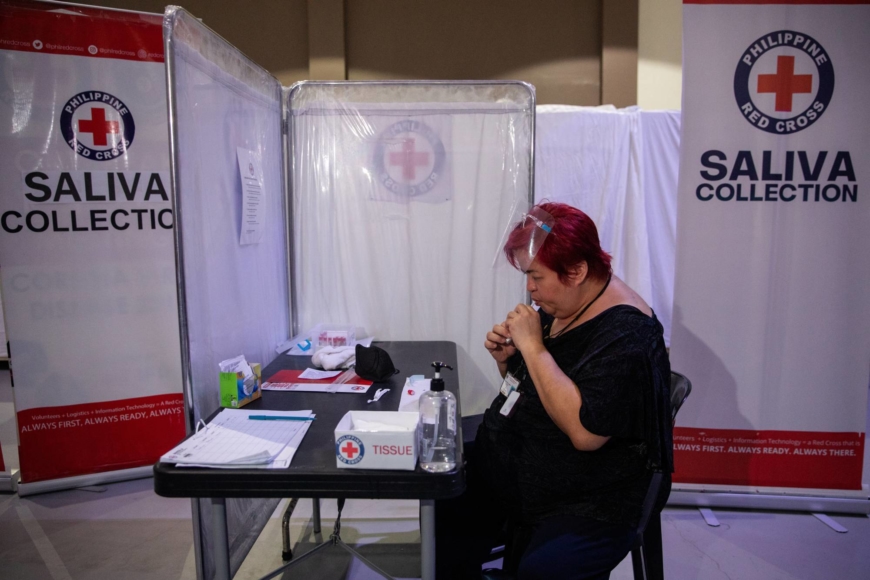[ad_1]
MANILA – According to one rumor circulating in the Philippines, the coronavirus vaccine will allow President Rodrigo Duterte to kill people at the push of a button.
Elsewhere in the country of 108 million, memories of a dengue vaccine that has been banned locally are putting people off the idea of immunization even before the campaign begins.
“Many kids got sick after receiving that vaccine,†62-year-old Crisanta Alipio said of the ill-fated vaccine against dengue, a mosquito-borne disease that can be deadly.
She said she was afraid of the novel coronavirus but even more afraid of vaccination.
The Philippines is due to start immunizations next month despite suffering Southeast Asia’s second-worst outbreak of the coronavirus with more than half a million infections and over 10,000 deaths.
But officials acknowledge they have an uphill struggle to persuade many people to take it, on top of the logistical difficulties in reaching 2,000 inhabited islands with a precarious health system in the Southeast Asian archipelago.
“Messaging has to be very concrete and evidence based to encourage people to receive the vaccines,†Health Ministry undersecretary Rosario Vergeire said.
“We are assuring Filipinos that whatever vaccines that will be brought in and provided will go through a stringent process of regulation.â€
Confidence in vaccines was knocked by controversy over French company Sanofi’s Dengvaxia.
Rolled out rapidly in 2016 to more than 800,000 children to protect them from dengue — it was banned after its maker said it could worsen the disease in people who had not previously been exposed to the infection.
That led to two congressional inquiries and more than 100 criminal cases that linked child deaths to the anti-dengue shot — though such links have never been proved.
Sanofi has repeatedly said Dengvaxia is safe and effective and the vaccine has been approved for use by the United States and European Union.
After that episode, the Philippines fell from one of the top 10 countries for confidence in vaccines to no higher than 70th place. The number of children who were fully vaccinated fell from 85% in 2010 to 69% in 2019.
To address the fears, health workers would hold town hall and online meetings and be given special training on how to answer questions, said Carlito Galvez, a former army general running the anti-COVID-19 campaign, told the Senate.
The aim is to inoculate 70 million adults this year.
In parts of the southern Philippines, the big fear is of a state-sponsored death campaign — not completely far-fetched in a country where Duterte’s drug war has left nearly 6,000 thousand dead since he took office in 2016.
Remote southern regions are the scene of both communist and Islamist insurgencies.
“Some of the information shared on Facebook and text messages said the COVID-19 vaccine contained a microchip which can be controlled remotely by President Duterte, and once he pushes a button, the person who received the vaccine will die,†said Nasser Alimoda, a government doctor in Lanao del Sur province.
Everywhere, there is concern over the specific vaccines that the Philippines plans to use too — particularly over Chinese company Sinovac Biotech’s vaccine, for which one study showed effectiveness of little over 50%, though another gave it over 91%.
One opinion poll showed fewer than a third of Filipinos were willing to get inoculated against coronavirus.
“Vaccination programs will go to waste if people refuse to get the shots,†a former health minister, Esperanza Cabral, said.
Apasrah Mapupuno, the head of the government’s Lanao del Sur health team, said she had asked dozens of health workers and others if they would roll up their sleeves for a COVID-19 vaccines.
Not one said ‘yes.’
“That is the big problem,†Mapupuno said. “How can the health workers convince the community to get vaccinated if they themselves are not sold on COVID-19 vaccines?â€
In a time of both misinformation and too much information, quality journalism is more crucial than ever.
By subscribing, you can help us get the story right.
[ad_2]
Source link







